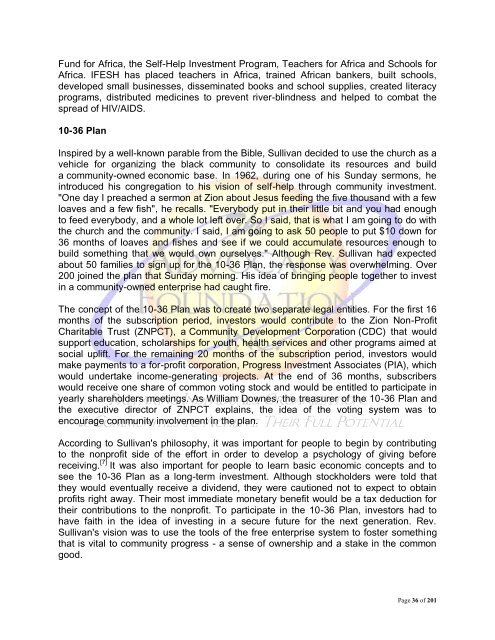Create successful ePaper yourself
Turn your PDF publications into a flip-book with our unique Google optimized e-Paper software.
Fund for Africa, the Self-Help Investment Program, Teachers for Africa and Schools for<br />
Africa. IFESH has placed teachers in Africa, trained African bankers, built schools,<br />
developed small businesses, disseminated books and school supplies, created literacy<br />
programs, distributed medicines to prevent river-blindness and helped to combat the<br />
spread <strong>of</strong> HIV/AIDS.<br />
10-36 Plan<br />
Inspired by a well-known parable from the Bible, Sullivan decided to use the church as a<br />
vehicle for organizing the black community to consolidate its resources and build<br />
a community-owned economic base. In 1962, during one <strong>of</strong> his Sunday sermons, he<br />
introduced his congregation to his vision <strong>of</strong> self-help through community investment.<br />
"One day I preached a sermon at Zion about Jesus feeding the five thousand with a few<br />
loaves and a few fish", he recalls. "Everybody put in their little bit and you had enough<br />
to feed everybody, and a whole lot left over. So I said, that is what I am going to do with<br />
the church and the community. I said, I am going to ask 50 people to put $10 down for<br />
36 months <strong>of</strong> loaves and fishes and see if we could accumulate resources enough to<br />
build something that we would own ourselves." Although Rev. Sullivan had expected<br />
about 50 families to sign up for the 10-36 Plan, the response was overwhelming. Over<br />
200 joined the plan that Sunday morning. His idea <strong>of</strong> bringing people together to invest<br />
in a community-owned enterprise had caught fire.<br />
<strong>The</strong> concept <strong>of</strong> the 10-36 Plan was to create two separate legal entities. For the first 16<br />
months <strong>of</strong> the subscription period, investors would contribute to the Zion Non-Pr<strong>of</strong>it<br />
Charitable Trust (ZNPCT), a Community Development Corporation (CDC) that would<br />
support education, scholarships for youth, health services and other programs aimed at<br />
social uplift. For the remaining 20 months <strong>of</strong> the subscription period, investors would<br />
make payments to a for-pr<strong>of</strong>it corporation, Progress Investment Associates (PIA), which<br />
would undertake income-generating projects. At the end <strong>of</strong> 36 months, subscribers<br />
would receive one share <strong>of</strong> common voting stock and would be entitled to participate in<br />
yearly shareholders meetings. As William Downes, the treasurer <strong>of</strong> the 10-36 Plan and<br />
the executive director <strong>of</strong> ZNPCT explains, the idea <strong>of</strong> the voting system was to<br />
encourage community involvement in the plan.<br />
According to Sullivan's philosophy, it was important for people to begin by contributing<br />
to the nonpr<strong>of</strong>it side <strong>of</strong> the effort in order to develop a psychology <strong>of</strong> giving before<br />
receiving. [7] It was also important for people to learn basic economic concepts and to<br />
see the 10-36 Plan as a long-term investment. Although stockholders were told that<br />
they would eventually receive a dividend, they were cautioned not to expect to obtain<br />
pr<strong>of</strong>its right away. <strong>The</strong>ir most immediate monetary benefit would be a tax deduction for<br />
their contributions to the nonpr<strong>of</strong>it. To participate in the 10-36 Plan, investors had to<br />
have faith in the idea <strong>of</strong> investing in a secure future for the next generation. Rev.<br />
Sullivan's vision was to use the tools <strong>of</strong> the free enterprise system to foster something<br />
that is vital to community progress - a sense <strong>of</strong> ownership and a stake in the common<br />
good.<br />
Page 36 <strong>of</strong> 201

















